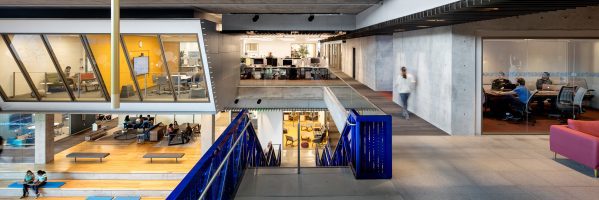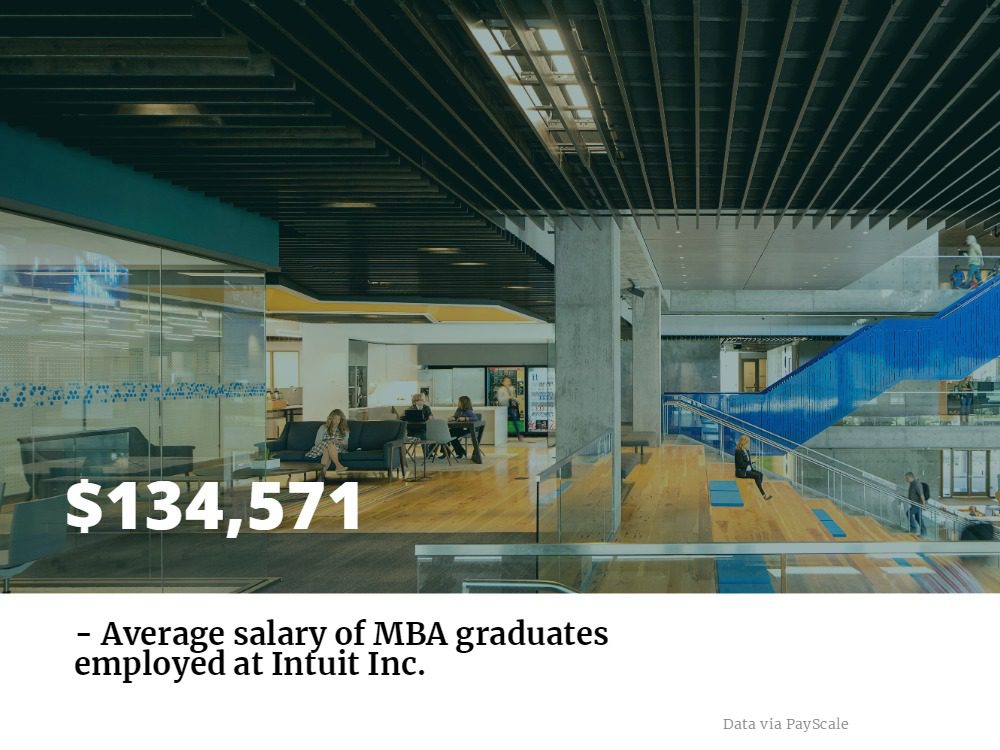How To Break Into the Tech Industry: Intuit Inc.

Since 1983, Intuit Inc.—the Mountain View, CA software company that spearheaded the creation of products like TurboTax, Quickbooks, and Mint—has effectively changed the way the average person manages their money. And with more and more MBAs shedding their finance industry aspirations for a role in tech, a job with one of the most well-regarded tech organizations is looking especially ideal.
Why Should I Join Intuit Inc.?
Intuit Inc. was ranked 13th overall on Fortune’s 2017 list of the “100 Best Companies to Work For,” and 30th overall on Glassdoor‘s newest “Best Places to Work” list. The company takes a holistic approach to ensuring company well-being. Intuit has 24-hour onsite gyms, and even provides a certain amount of bicycles for employees who bike to work. Fortune listed job perks like telecommuting, compressed work weeks, college tuition reimbursement, daily free time to pursue other projects, and paid time off for volunteering.

Many of the positions at Intuit are, unsurprisingly, tech-based, so an MBA may not be as advantageous in getting an engineering position. However, according to PayScale data, MBAs are typically the highest earners at Intuit, with the average MBA earning nearly $125,000 per year.
What Internships are Available?
Intuit Inc. has a specific internship for MBAs: the MBA Intern Marketing Manager position. This internship is offered in Intuit’s California locations in Mountain View and San Diego, as well as in Plano, Texas. In this position, MBAs help the company gain insight into the needs of customers and the effectiveness of current marketing strategies, through research and testing. According to the company website, these interns also have the opportunity to partner with teams working in, “Product Management, Development, Finance and Care.” This is a paid summer internship, so students can cover the cost of living while observing and contributing to innovations at a leading software company.
Intuit is currently offering a variety of other internship positions that might be appropriate for MBAs, such as a Marketing Intern position in London. MBAs specializing in Supply Chain Management can apply to be Supply Chain Specialist Interns, and work closely with Intuit’s Supply Chain Finance team.
At the company, it is not uncommon for intern’s to parlay their positions into full-time jobs after graduation. The company’s website says that its internship program, “is truly an ‘early identification’ program, focusing on identifying and investing in high potential university students really to encourage them in their early careers and potentially to bring their talent back to Intuit after graduation.”
How to Get Hired at Intuit
In recent years, Intuit has moved from a traditional interview process, to an innovative method of vetting candidates that incorporates virtual reality. Their hiring program, Assessing for Awesome (A4A), requires that candidates: “Speak for five minutes about themselves; speak for 15 minutes about two or three projects of which they’re proud; prepare a 15-minute presentation on a case study or coding exercise; participate in a 25-minute question and answer period.” The interview is conducted by an advanced staff member who works closely with the position in question. The company uses virtual reality to allow candidates to demonstrate their skill sets.
Intuit Inc. hires graduates and interns from a number of the top-rated business programs in the country, including the Northwestern University Kellogg School of Management in Chicago, Illinois, which brought in full-time employees and interns from the most recent graduating class. Some of the most highly-regarded MBA programs offer various tech industry advantages, including the recently introduced Tech MBA at NYU Stern, and the promising new Cornell Johnson Tech MBA, offered at the school’s new New York City campus.
For more information on which school’s provide the best opportunities to join the tech industry, head on over to our sister site Clear Admit, which recently took a look at programs from other established institutions like the UCLA Anderson School of Management and MIT Sloan.
Gear Up For These January MBA Deadlines

The next round of MBA admissions is swiftly approaching, with the eve of 2018 almost here. Time to mark those calendars!
New York City
The NYU Stern School of Business, Columbia Business School, and Rutgers Business School, Newark/New Brunswick are the big headliners when it comes to deadlines in the New York City metro in January.
The Forham University Gabelli School of Business, and the Syracuse University Whitman School of Management Online MBA program also have deadlines in the first weeks of the new year. Click here for more information on upcoming New York City metro deadlines.

The third round for application deadlines to Cornell’s Tech MBA on its new Roosevelt Island campus arrives January 10, 2018.
Los Angeles
The biggest Los Angeles metro business school institutions all have a slew of deadlines ready to pass within the first weeks of the new year, including the UCLA Anderson School of Management‘s full-time MBA, USC Marshall‘s part-time program, as well as the Claremont University Peter F. Drucker and Masatoshi Ito Graduate School of Management‘s part-time MBA.
Take a look at the coming deadlines in the Los Angeles metro here.
Toronto
Two Toronto metro schools have deadlines in early January, with the Ivey Business School full-time, Accelerated, and EMBA deadlines all falling on January 8, 2018. The second round deadline to the University of Toronto Rotman School of Management‘s full-time MBA also falls on January 8.
Take a look at the coming deadlines in the Toronto metro here.
Chicago
Two of the most prominent business schools in the entire Chicago metro—Chicago Booth and Northwestern Kellogg—feature a bevy of full-time, part-time, and Evening MBA deadlines before January 10. As well, the Quinlan School of Business at Loyola University’s full-time MBA for its annual spring intake arrives on January 15, 2018.
Just outside of the city, on the near border of Indiana, the Notre Dame Mendoza College of Business’ second round deadline for its full-time MBA program is set for January 9.
Get familiar with the coming deadlines in the Chicago metro here.

The second round of deadlines for the Northwestern Kellogg part-time and full-time MBA programs arrives on Jan. 10, 2018.
Boston
In Boston, the heart of America’s higher education, every January is a major month for several of the country’s most prominent MBA programs. Indeed, Harvard Business School and MIT Sloan, as well as the Questrom School of Business at Boston University, the Carroll School of Management at Boston College, and Northeastern University’s D’Amore-McKim School of Business all have MBA deadlines right at the beginning of the new year for various MBA programs.
Take a look at the coming deadlines in the Boston metro here.
For updated deadline information in Philadelphia, Washington DC, Baltimore, Atlanta, Dallas, Houston, Denver, San Francisco, San Diego, Seattle, and London, click here.
Kings of the North: Should You Get a Part-Time MBA in Chicago or Toronto?

In many ways, Chicago and Toronto are very similar world class cities: Both are situated on a Great Lake, host an “Original Six” hockey team, and both metros suffer from “second city” inferiority complexes. Both metros also have plenty of competitive business school options for professionals who want to earn an MBA. Continue reading…
This Notre Dame Professor Was Named The World’s Leading Entrepreneur Expert

Notre Dame Mendoza College of Business professor Dean Shepherd was recently recognized as the leading scholar in entrepreneurship research, according to a recent study published in Journal of Small Business Management.
“Contributing Forces in Entrepreneurship Research: A Global Citation Analysis“—co-authored by Chang Xu of Renmin University, Yining Chen of Western Kentucky University, Ann Fung of University of Washington and Kam C. Chan of Western Kentucky University—concluded that Shepherd contributed to entrepreneurship research more than any other academic figure.
The study used a sample of more than 2,000 entrepreneurship articles published in leading journals between 2002 and 2013. Shepherd was identified as both the most prolific author with 54 total articles and the most impactful, as measured by a weighted normalized citation count.
Entrepreneurship is a relatively new field of research, and therefore presents “as a unique opportunity for a wider range of institutions and scholars to collaborate and develop expertise and leadership research,” according to the study.
With that being said, Shepherd has had his work published in top entrepreneurship, general management, strategic management, operations management, and psychology journals and has written or edited more than 20 books.
One of his more recent papers is titled “The Surprising Duality of Jugaad: Low Firm Growth and High Inclusive Growth” and explores entrepreneurship in resource-poor environments. According to a press release, “jugaad” is a Hindi word that means finding a low-cost, intelligent solution to a problem by thinking constructively and differently about innovation and strategy. The paper was published in the Journal of Management Studies.
Shepherd is the Ray and Milann Siegfried Professor of Entrepreneurship at Notre Dame’s Mendoza College of Business. He received his doctorate and MBA from Bond University in Australia.
Read “Contributing Forces in Entrepreneurship Research: A Global Citation Analysis” from the September edition of the Journal of Small Business Management and check out his 2014 Ted Talk “How Do We Learn From Failure?” below.
From Just One Woman to 39 Percent of the Class—and Other Ways LBS Has Changed Over the Past 50 Years

The 2017-18 academic year marks the 50th anniversary of the MBA program at London Business School (LBS). Since 1968, the school has offered a two-year Master of Science (MSc) in Business Studies degree program—the original MBA—and has continuously refined its offerings since that time. In celebration of the 50-year mark, LBS is looking back at how far the program has come.
The Beginning
In 1966, two years after London Business School opened its doors, the school launched a two-year Master of Science (MSc) in Business Studies. The first class consisted of 35 men and just one woman, with the average age around 25 years old. The goal of the two-year degree was to prepare students for employment. In fact, according to the website, employment was seen as “one of the most significant aspects of the school’s progress at this stage of its development.”
After graduation, most students joined manufacturing firms, and a few went into merchant banking, management consultancy, and advertising. Their job functions included marketing and financial executives, planning personnel, and personal assistant roles.
As for the feedback on the first year of study, a report on the class stated, “The overall academic performance of the students during the year has been more than satisfactory. The course of studies is arduous and the number of hours of work required is much above average, imposing a considerable workload both on students and staff.”
The Early Years
In the early years of the program, growth was slow but steady. In 1971, the class size grew to 86 students and by 1975, 108 students were admitted, including 16 women. Throughout this time, LBS made various modifications to its program.
- In 1973, LBS introduced the International Management Program, which gave 10 students the change to study abroad in Paris or at New York University.
- In 1978, the International Management Program expanded to include Harvard, Stanford, Wharton, Chicago, and top European institutions.
The 1980s
The 1980s were a time of change for LBS and the MBA program. During these years, banking and finance overtook manufacturing as the top industry for graduates. In addition, LBS continued to increase its international reputation; about half of its class comprised non-British students by the end of the decade, with more 30 nationalities represented. Most importantly, the Class of 1987 was the first to be awarded an MBA rather than an MSc degree. In an annual report, the school stated, “This more accurately and effectively conveys the spirit of the program, and the type of qualifications our students are aiming for.”
- In 1982, LBS introduced a new part-time master’s program. The first class accepted 60 people and allowed students to complete their studies over two and a half to three years while still working.
- In 1984, three more U.S. schools joined the International Exchange Program including Dartmouth Tuck, MIT Sloan, and Northwestern Kellogg.
The 1990s
In the 1990s, LBS adopted a more flexible format for its MBA program. The school added increased training in “soft skills” and introduced computer-based management simulation games. The class size also increased to 271 students, with 79 percent of students coming from outside the United Kingdom. Consulting became the top choice for graduates, and manufacturing shrunk to just 11 percent.
- In 1992, LBS introduced a language requirement where students must be fluent in English and one other language to graduate. In addition, the part-time master’s was re-launched as the Executive MBA.
- By 1996, entrepreneurship became an important part of the program, and the school launched several electives with an entrepreneurial focus, including “Small Business Management” and “Financing the Entrepreneurial Business.”
- 1999 was the first Financial Times Global MBA ranking, and LBS ranked #1 in Europe and #8 in the world—the only non-U.S. school in the top 10.
The 2000s
By the 2000s, LBS had become a global leader in MBA education—and in 2009 it became the first non-U.S. school to top the Financial Times ranking. The MBA program was reformatted for increased flexibility, allowing students to graduate in 15 to 21 months. The class size also increased to 315 students, with 89 percent of the class from 59 countries outside the United Kingdom.
- In 2001, LBS ranked as the best Global MBA by the Financial Times, and Forbes ranked LBS as #1 in Europe and #2 in the world for return on investment.
- In 2003, LBS became the first European school to join the Forté Foundation to increase women in business, and in 2005, women made up 22 percent of the class.
The 2010s
In the last decade, London Business School once again revised its MBA program to give students even greater flexibility. The school also continued to increase its size, welcoming 468 students by 2018—12 times the size of the first class in 1968. In addition, women now make up 39 percent of the MBA class, and students represent 77 different nationalities.
- In 2010, LBS started its Incubator Program to help entrepreneurs. As of 2017, 58 businesses have completed the incubator, raising more than £31 million and creating 440 full-time jobs.
- In 2012, LBS launched the Global Business Exchange (GBE), giving students the opportunity to spend a week in another country with options ranging from South Africa to the United States.
- In 2016, LBS completed its first fundraising campaign, raising £125 million.
To learn more about the 50th anniversary celebration of London Business School’s MBA, visit the school website.
This article has been edited and republished with permissions from our sister site, Clear Admit.
McDonough Professor Douglas McCabe Honored With New Award

Georgetown Professor Douglas McCabe of the McDonough School of Business was recently honored with the “Best Paper Award” at the 2017 Annual Conference of the American Society for Competitiveness in Washington DC. This year’s conference theme was “Breaking Down Barriers to Competitiveness: A Path Forward.”
McCabe’s paper was titled “Conflict Resolution and Organizational Justice in the Workplace—The Evidence Based Research” and discussed current evidence-based research on how employees can achieve justice, equity, and voice within organizations.
“Conflict and its resolution play a critical role in organizations,” McCabe said. “A growing proportion of companies and corporations have turned to various dispute resolution procedures to resolve the complaints and grievances of their employees within the organizational behavior context.”
McCabe’s work has already become more than just research, having been put into practice at progressive firms. “Many of these quality and legitimate systems were put into place based upon the policy recommendations of my stream of research, as well as the research of other human resource management scholars,” he said.
This was the fourth Best Paper Award McCabe has earned during his career at Georgetown’s McDonough School of Business. The professor of management has worked at McDonough since 2013, teaching EMBA and management classes. Additional awards earned by McCabe include:
- Recipient of the Award for the Best Conceptual Research Paper at the Fourteenth Annual Conference of the American Society for Competitiveness
- Recipient of the Best Paper Award at the Fourth Annual World Business Congress of the International Management Development Association
- Recipient of the Best Professor Award of the inaugural class of the Executive Master’s in Leadership/District of Columbia Public School Principals at the McDonough School of Business
- Recipient of the Excellence in Education Award of the Labor and Employment Relations Association
- Twice Recipient of the Joseph F. LeMoine Award for Undergraduate and Graduate Teaching Excellence of the McDonough School of Business
- Twice the Recipient of the Outstanding Reviewer Award from the Emerald Literarti Network of the Emerald Group Publishing Limited. Additionally
- Recipient of the Certificate of Recognition from the National Office of The Phi Beta Kappa Society
McCabe earned his Ph.D. from Cornell University, his M.S. from Loyola University of Chicago, and his B.A. magna cum laude (Phi Beta Kappa) from Marquette University. Along with his written work in numerous academic refereed journal articles, papers, monographs, and speeches, he is also an active domestic and international management consultant.
